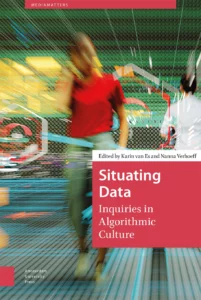News
Recent publication: Situating Data. Inquiries in Algorithmic Culture.

The Department of Media and Culture Studies (MCW) at the Faculty of Humanities at Utrecht University just released the edited volume Situating Data – Inquiries in Algorithmic Culture. This collection was initiated by dr. Karin van Es and our core member prof. dr. Nanna Verhoeff because the MCW researchers wanted to bring together the work around data in the department.
Taking up the challenges of the datafication of culture, as well as of the scholarship of cultural inquiry itself, this collection contributes to the critical debate about data and algorithms. How can we understand the quality and significance of current socio-technical transformations that result from datafication and algorithmization? How can we explore the changing conditions and contours for living within such new and changing frameworks? How can, or should we, think and act within, but also in response to these conditions? This collection brings together various perspectives on the datafication and algorithmization of culture from debates and disciplines within the field of cultural inquiry, specifically (new) media studies, game studies, urban studies, screen studies, and gender and postcolonial studies. It proposes conceptual and methodological directions for exploring where, when, and how data and algorithms (re)shape cultural practices, create (in)justice, and (co)produce knowledge.

